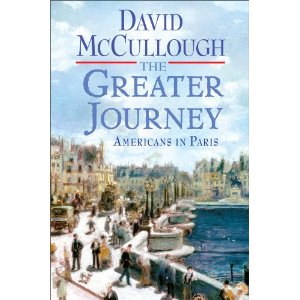The Greater Journey, by David McCullough
David McCullough is my favorite history author. Brilliantly written narratives that are thoroughly researched, he brings history to life with a grasp of details without losing sight of the big picture. He won the Pulitzer Prize for his work on Truman and John Adams, and should have won for 1776. These are broad, sweeping stories of bigger than life people and events.
But McCullough can also bring the smaller events of history to life. His book The Johnstown Flood kept me enthralled. As did The Great Bridge, Mornings on Horseback, and The Path Between the Seas.
In The Greater Journey, McCullough tackles a blend of the two approaches to history. This is a broad book, covering 70 years of history from 1830-1900. But it is also a series of smaller stories of lesser known men and women, most of them artists or doctors. All of them were Americans who visited Paris to advance their skills or complete their studies. McCullough tells the story of how that Parisian connection influenced American art, culture, medicine, politics … the list goes on. Some of these Americans are household names: Harriet Beecher Stowe, Samuel Morse, Oliver Wendall Holmes, etc. Some are lesser know, such as artists John Singer Sargent and Mary Cassatt.
I really enjoyed this book because of it’s elegant writing, great story telling, attention to detail, and classic approach to culture. If authors wrote as well as McCullough, I guarantee you the world would read more!
Still, this is not a book that is going to have a broad appeal. The story of how American men and women visited Paris, and how that impacted our own culture, is nuanced at best. One might even say obscure. It falls into the category of interesting reading, but not necessary reading. Only a lover of history or an admirer of McCullough is going to make a point of reading this book.
Now watch my prediction fall flat; the book will most likely be on the NYTimes bestseller list for months (it is #3 currently). I hope it stays on the list for a long time because it clearly deserves to be.

